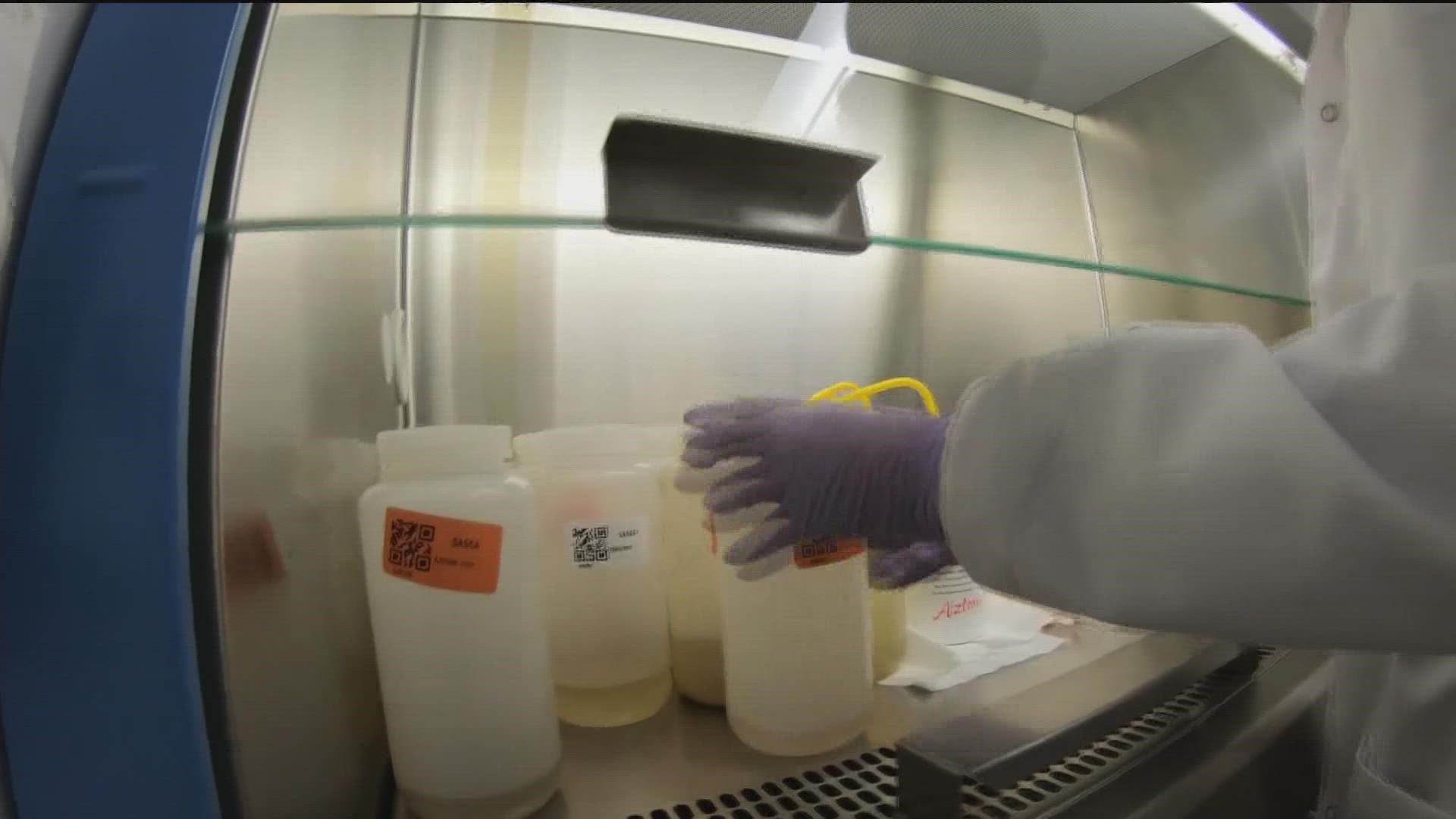SAN DIEGO COUNTY, Calif. — A UC San Diego program that has monitored wastewater for the virus that causes COVID-19 for more than a year has expanded to detect the presence of monkeypox, it was announced Wednesday.
Monitoring and testing for the monkeypox virus is a relatively simple add-on to the current wastewater surveillance program for SARS-CoV-2, said Rob Knight, professor and director of the Center for Microbiome Innovation at UCSD.
"It's the same process as SARS-CoV-2 qPCR monitoring, except that we have been testing for a different virus," he said. "Monkeypox is a DNA virus, so it is a bit of a surprise that our process optimized for SARS-CoV-2, which is an RNA virus, works so well."
Researchers at the university began experimenting with the possibility the test might work with both virus types in May when the first American cases of monkeypox were reported and began monitoring wastewater from the Point Loma treatment plant, which serves 2.2 million San Diegans, for the presence of monkeypox virus in early June.
The first positive indicator occurred July 10, at levels near the limit of detection. Levels have dramatically increased since then. Knight said it remains to be seen whether monitoring virus load levels in wastewater can predict future infection or case rates.
"We don't yet know if the data will anticipate case surges like with COVID," he said. "It depends on when the virus is shed from the body relative to how bad the symptoms are that cause people to seek care. This is, in principle, different for each virus, although in practice wastewater seems to be predictive for multiple viruses."
Dr. Christopher Longhurst, chief medical officer at UCSD Health, said monkeypox monitoring is an important innovation in what he called "anticipatory surveillance."
"Rising levels of monkeypox in wastewater clearly correlate with the increasing spread of this virus," he said. "Detection and monitoring will help alert us to situations before they become crises, providing time for health systems and public agencies to respond, prepare and act."
California declared a public health emergency for monkeypox on Aug. 1; San Diego County followed suit the next day. On Aug. 4, a federal public health emergency was declared with more than 7,000 monkeypox cases reported nationwide. It is just the fifth such national emergency since 2001. The nation remains in a state of emergency over the coronavirus pandemic.
San Diego County supervisors unanimously ratified the state of emergency Tuesday in an attempt to bolster vaccination efforts. It will need to be ratified again every 30 days, as needed. The state of emergency declaration will allow the county to seek state assistance and use public health infrastructure for testing, contact tracing and case investigation.
Of 104 total cases as of Tuesday reported throughout the county, all were male and 86 self-identified as gay or bisexual. While monkeypox has been spreading locally among the LGBTQ+ community, it is not isolated to that subgroup.
"At this time, monkeypox outbreaks are disproportionately impacting our LGBTQ community, but we know it can spread to others," Supervisor Nathan Fletcher said. "And it is vitally important that we not stigmatize any individual, that we not stigmatize any community, that we not cast any aspersions."
The first case in the county was reported June 15. The virus has infected people ranging in age from 21 to 62.
Since late May, the county has received 4,687 doses of monkeypox vaccine. Of those, 3,251 have been distributed -- including 1,550 in the past week -- and 2,267 have been administered. The actual number might be higher because it takes a few days for the vaccine registry to be updated.
The monkeypox vaccine is a two-dose series, administered 28 days apart. Following guidance from the California Department of Public Health, given the low supply of vaccine, the county is presently recommending that first doses be administered to as many eligible people as possible. One dose of the monkeypox vaccine is 80% effective, the county Health and Human Services Agency said. Second doses will be administered when more vaccine is available.
Monkeypox is generally spread through intimate skin-to-skin contact, resulting from infectious rashes and scabs, though respiratory secretions and bodily fluids exchanged during extended physical episodes, such as sexual intercourse, can also lead to transmission, according to the U.S. Centers for Disease Control and Prevention.
Symptoms include fresh pimples, blisters, rashes, fever and fatigue. There is no specific treatment. People who have been infected with smallpox, or have been vaccinated for it, may have immunity to monkeypox.
According to health officials, the vaccine can prevent infection if given before or shortly after exposure to the virus.
However, supply of the vaccine is limited. In a statement to CBS 8, San Diego County HHSA South Region (Chula Vista) says:
"This location and other County STD clinics will continue to offer services for those experiencing sexually transmitted diseases but no longer has monkeypox vaccinations at this time. Signs are being placed advising the public there is no vaccine available."
Fletcher and the HHSA will host a virtual monkeypox town hall at 6 p.m. Thursday to allow people to learn about the risks, and the county's response to the local health emergency. County Chief Medical Officer Dr. Eric McDonald will moderate the conversation. Joining McDonald will be San Diego Mayor Todd Gloria, Nick Macchione, HHSA director and Dr. Wilma J. Wooten, county public health officer, among others.
The link to the town hall is tinyurl.com/MonkeypoxTownhall.
San Diego County residents can receive information about monkeypox via text. Health officials are sending real-time information about the impact of monkeypox in the region along with details about available services. People can sign up to receive messages by texting COSD MONKEYPOX to 468-311.
The county updates its data on monkeypox every day at 4 p.m.
According to the city's 2-1-1 help line, there are currently no monkeypox vaccine events scheduled.
WATCH RELATED: San Diego County to host virtual monkeypox townhall (Aug. 10, 2022)

